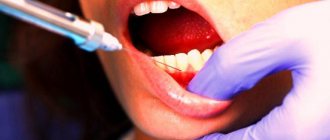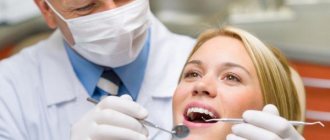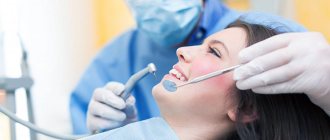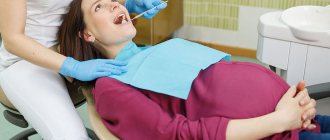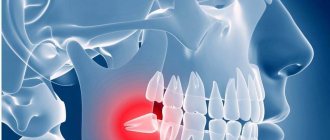While expecting a child, the body of the expectant mother undergoes various changes associated with the restructuring of all organs and systems. Which must now ensure the vital functions of both the female body and the development of the unborn child. For this reason, a woman’s metabolism may change, a lack of microelements and vitamins in the body may be detected, etc. Very often this is reflected in the condition of the teeth, since a growing fetus requires a lot of calcium for its formation. Therefore, doctors strongly recommend taking care of your teeth during pregnancy to prevent their damage and loss in the future.
The more attention a wisdom tooth requires during pregnancy. Since “eights”, due to their characteristics, can cause a lot of inconvenience to any person, and when carrying a child this can become especially problematic.
Content:
- Pregnancy and wisdom teeth - how to recognize the process of active growth
- Pericoronitis - complication 2.1. Classification of pathology
- What can an expectant mother do on her own?
- Removal
- What you should never do
- Competent treatment
- Rehabilitation after surgery
It happens that wisdom teeth begin to actively grow during pregnancy .
This is due to the fact that “eights” are cut later than other units. The process of their active growth can be triggered by hormonal and metabolic changes that occur in a woman’s body during pregnancy. The process of the appearance of eighth units in itself cannot be called negative - it is a variant of the norm. But for many expectant mothers it occurs with complications. It was also not uncommon for units to stand at the wrong angle and put extreme pressure on their “neighbors.” And this is an indication for emergency removal.
Pregnancy and wisdom teeth - how to recognize the process of active growth
The symptoms that occur in pregnant women when the bone tissue above the figure eight “gives way” often differ from the classic picture. First, the woman notes that she began to get tired faster. Her performance decreases and her body temperature rises. In this case, the condition of the gums in the first days of symptoms may not change in any way.
Only after a few days (and sometimes weeks) it becomes clear that all the ailments are associated with teething. Signs characteristic of the situation are:
- pain when feeling the inflamed gum;
- acquisition of a red-blue hue by the mucous membranes located in the eruption zone;
- involuntary cheek twitching;
- enlarged and painful lymph nodes;
- the appearance of bad breath (it is not possible to get rid of it using standard hygiene products);
- hoarseness of voice;
- discomfort or throbbing pain in the ear on the causative side;
- painful sensations when chewing food, swallowing saliva, liquids.
If the first symptoms of the eruption of “eights” appear, it is important for the pregnant woman to calm down and not panic. It is quite possible that the emergence of new units will not be associated with any problems. But if the pain becomes severe, you should definitely get a dental consultation.
When should teeth be removed during pregnancy?
Due to the fact that the wound can become infected, and also due to the influence of medications, doctors do not always remove painters and incisors. But in some cases there is no other choice:
- If your gums become inflamed due to advanced caries.
- If purulent damage to the roots of the tooth (pulpitis) has developed.
- If the bone tissue is significantly destroyed.
- If the patient has tumors that prevent her from closing her jaw.
- If the tooth constantly hurts, and the discomfort is not relieved by approved medications.
Pericoronitis - a complication
Pericoronitis (pericoronitis) is a condition in which the soft tissues surrounding an erupting tooth become severely inflamed. Very often, this diagnosis is made to patients who have begun to see “figure eights” in their mouths. It is characterized by symptoms:
- sore gums;
- swelling;
- specific taste in the mouth.
For pericoronitis, surgery is most often indicated. During this procedure, the doctor excises the “hood” covering the unit to facilitate its eruption. Also, with this complication, there is sometimes a need for removal.
Classification of pathology
Pericoronitis is classified into:
- serous;
- purulent.
The disease always develops from the serous form. This is its initial stage. A large amount of serous fluid accumulates in the mucous tissues. Pain occurs when palpating the affected area.
If a woman does not go to the dentist on time, the serous form turns into a more dangerous one - purulent. Then the swelling becomes even stronger, and the body temperature periodically rises. A “hood” begins to cover the bone tissue, under which there is a large amount of pus.
The purulent form is treated exclusively surgically . After opening the “fistula,” the tissues are washed and the patient is prescribed antibiotics. Considering that such manipulations are extremely undesirable during the period of bearing a child, it is important not to start the disease and consult a doctor at the first sign of it.
What can an expectant mother do on her own?
Pregnant women should not self-medicate. But, if the eruption of wisdom teeth proceeds according to the classic scenario and does not cause negative symptoms, the woman can calm down. In this case, she does not need to run to the dentist.
To eliminate the occurrence of unpleasant sensations associated with putting pressure on the inflamed gum, you must try to chew food on the “healthy side”. After eating, be sure to rinse your mouth with warm water or a decoction of herbs. It is also permissible to purchase a special pharmacy rinse for this purpose.
If the pain intensifies, medical consultation is indicated. If for some reason it is impossible to get it right now, the expectant mother can take a no-shpa tablet to reduce the pain. But this should be a one-time “action”.
How to relieve pain yourself
Rinsing with a soda solution (1 teaspoon of soda per glass of warm water) will help temporarily relieve toothache during pregnancy. You need to rinse your mouth more often, every 2 hours. In addition to soda, you can use Furacilin solution, decoctions of medicinal herbs - chamomile, oak bark, yarrow.
Not recommended
use herbs containing essential oils (sage, eucalyptus, peppermint, cloves, etc.), they can cause severe uterine cramps.
Severe dental pain during pregnancy can be treated with a suitable anesthetic. Steroid-based drugs and drugs that penetrate the placental barrier are contraindicated.
Removal
As practice shows, only in 5% of cases pregnant women have to pull out the “eight”. In other situations, it is possible to do without deletion. Extraction is permissible only if there are strict indications, including:
- inability to relieve severe pain using available painkillers;
- frequent recurrence of pericoronitis;
- the formation of an abscess affecting the facial nerve;
- destruction and suppuration of bone tissue;
- the formation of a hollow tumor on the bone in the figure eight area.
In all these cases, the woman is scheduled for dental surgery. Anesthesia is selected taking into account the duration of pregnancy and existing concomitant diseases. However, earlier than in the second trimester, extraction is contraindicated.
What you should never do
A pregnant woman is strictly prohibited from doing the following things, as they can lead to malformations of the fetus:
- Take analgesics without a doctor's prescription. All drugs of this pharmacological group have many side effects.
- Apply painkillers to the inflamed gum. Such advice is available on the Internet, but you cannot follow it. Such compresses increase inflammation and create conditions for the formation of ulcers. In addition, the active compounds of the medications used will be absorbed into the systemic bloodstream and negatively affect the health of the fetus.
- Warm the affected area. Heat increases local blood circulation and helps the purulent tumor grow faster.
Self-medication during pregnancy is unacceptable. This is important for all women in an “interesting” position to understand.
Competent treatment
Doctors can offer pregnant women only three options for eliminating inflammation during the eruption of wisdom teeth:
- Excision of the hood. The operation is simple and is performed under local anesthesia. The doctor makes a small incision, which reduces the likelihood of an abscess forming and speeds up the process of the “figure eight” appearance.
- Excision of the upper tissues of the mucous membrane. It is carried out if the doctor sees an abnormal bone structure in the image. The altered structures are then removed to save the tooth.
- Ripping out. It is used rarely and only if previous methods have proven ineffective. If extraction is unavoidable, it should be postponed until the threat to the health of the fetus is minimal.
At what stage of pregnancy can teeth be removed?
In an emergency situation, tooth extraction is possible at any time. But there are more or less preferable options.
First trimester
This period is considered the most crucial, because it is then that the foundations for the formation of the embryo are laid. During the first trimester, miscarriage is likely. Therefore, a woman should monitor her physical, psychological and emotional state.
The embryo takes many nutrients from the mother's body during the process of formation. We are talking about substances from a woman’s circulatory system. But due to the fact that the placenta has not yet formed, they can go directly to the baby. Therefore, X-rays, anesthetics, and nervous shock from visiting a doctor are undesirable. If possible, it is better to wait until 16-17 weeks.
Second trimester
This period is the most suitable for tooth extraction. The placental barrier has already been formed, the risk of miscarriage is reduced. Consequently, significantly less foreign substances, including anesthetics, reach the fetus. In addition, the belly is not too big yet, so it does not bother the girl. During this period, it is recommended to treat your teeth and conduct a preventive examination. You just need to refrain from bleaching so that the dyes do not enter the bloodstream.
Third trimester
During this period, anesthesia can be used without fear, since the placenta protects the child from the effects of drugs. But due to stress, the likelihood of premature birth increases.
Rehabilitation after surgery
If a woman was unable to avoid surgical treatment, she needs to pay maximum attention to the rehabilitation process. Recovery will be faster if the expectant mother:
- will follow all medical prescriptions;
- will provide complete rest to the damaged area (it should not be touched with hands, tongue, or foreign objects);
- will not eat solid foods;
- will carry out high-quality oral hygiene;
- He will come for a follow-up appointment when the dental surgeon says so.
Take care of the health of your smile. If you are planning to conceive, treat any existing oral diseases in advance. If the problem arose after conception, be sure to get dental care - do not risk your health and the health of your baby.
How to minimize the likelihood of deletion
Finally, let’s look at how preventive measures will help avoid an unpleasant procedure:
- regularly visit the dentist 1-2 times a year to solve problems in a timely manner;
- before planning a pregnancy, it is worth treating all teeth, removing damaged ones, filling those that can be restored;
- Monitor your diet throughout pregnancy. You should remove sweets from it as much as possible or try to brush your teeth after eating them;
- maintain careful hygiene;
- balance the diet to prevent deficiency of calcium and other microelements.
Finally, we note that prevention is in any case better than treatment, especially tooth extraction. Therefore, not only expectant mothers, but also those who are just planning a pregnancy, need to monitor the condition of the oral cavity and prevent the occurrence of serious problems that can negatively affect the health of both the woman herself and her baby.

